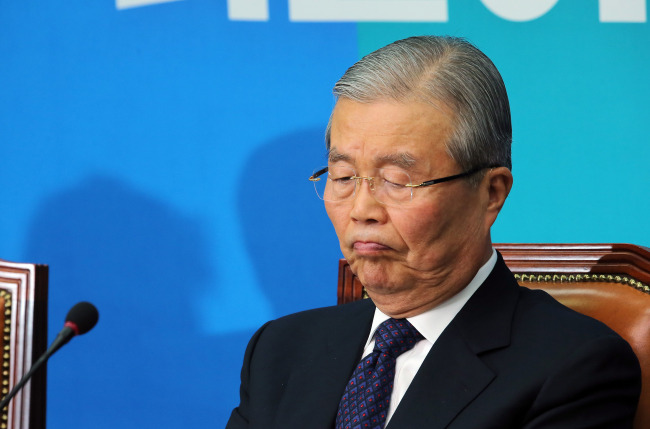Seeking to resolve the aftermath of its filibuster, the main opposition party’s chief laid down a new card on the table Wednesday — a strategic reunion with the party’s defectors ahead of the upcoming April general elections.
His suggestion came as the party is facing criticism for unilaterally terminating the parliamentary relay debate against the disputed antiterrorism bill, thus forfeiting the hard-earned political momentum.
“I suggest to the opposition bloc that we join hands in unity,” said The Minjoo Party of Korea’s interim chief Kim Jong-in at a party meeting.
“In order to judge the maladministration of the Park Geun-hye government over the past three years and to live up to the people’s expectations, it is crucial that the opposition circles come together and achieve victory on April 13.”
He thus reached out to the People’s Party led by Rep. Ahn Cheol-soo, who left the Minjoo camp late last year amid conflict with then-leader Rep. Moon Jae-in.
“That (Moon Jae-in) leadership, which many quoted as a key reason of their defection, is no longer in power, which should now make it easier (for defectors) to come back,” Kim said.
The party chief also alluded that his idea of unity involved a formal unification of the two parties and not just inter-party solidarity, implying that the People’s Party should integrate back into the Minjoo Party.
 |
| Kim Jong-in, interim chief of The Minjoo Party of Korea, attends the party’s leadership meeting Wednesday. Yonhap |
Kim’s eyebrow-raising proposal for unity is taken as an attempt to overcome the multiple challenges currently faced by the party, including supporters’ spreading disappointment over the sudden suspension of the filibuster.
“We have made every effort to share the details of the antiterrorism bill and to revise the inappropriate clauses,” Kim said. Kim had reportedly been the most eager to persuade party whip Rep. Lee Jong-kul on Monday to consider halting the filibuster to prevent any backlash, such as from deterring the passage of the revised public election bill to confirm the reallocation of the nation’s constituencies.
“But in consideration of various political agendas, most of all the nearing April 13 elections, we have decided to adjourn the filibuster and move on to urgent pending issues,” he added.
The filibuster was deemed the opposition’s last resort to block the ruling conservative Saenuri Party’s enforcement of the disputed bill, so the termination will eventually lead to the bill’s passage, Kim admitted.
“But we will by all means win a parliamentary majority in the elections and then revise the law,” he suggested.
The rival parties had agreed earlier last week to put the constituency bill to a floor vote, but follow-up legislative procedures were held off once the opposition kicked off the unlimited parliamentary relay talk on Feb. 23.
The leadership’s decision to voluntarily end the filibuster was welcomed by the rival Saenuri, which also took time to slam Kim’s proposal for a reunion with defectors.
“I do not understand why (the Minjoo Party and People’s Party) would reunite at this point in time, after all the fuss they made about their differences in policies,” the Saenuri Party’s floor leader Rep. Won Yoo-chul told reporters Wednesday.
“Such capricious actions would only trigger (the public’s) distrust of politics.”
Rep. Ahn, too, displayed discomfort toward Kim’s call.
“I cannot but have doubts of (Kim’s) intentions,” he told reporters.
“I believe that the top priority task (for the Minjoo Party) at this point in time is to reorganize itself and unite its own members.”
By Bae Hyun-jung (tellme@heraldcorp.com)

